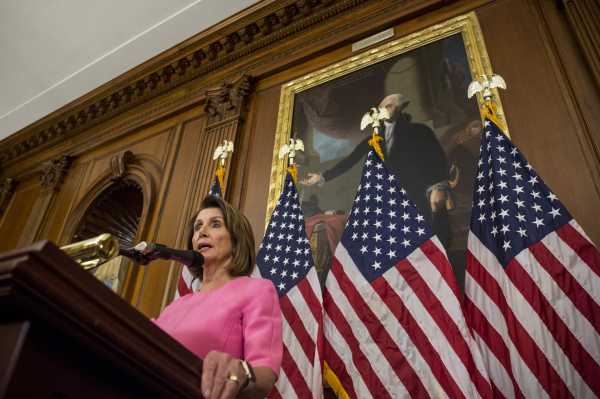
To people whose main reference point for politics is the late Obama years, the 2016 presidential campaign, and the post-Bernie Sanders blossoming of left-wing politics in the United States, Nancy Pelosi seems — and, indeed, is — an establishment figure.
But for those whose political horizons go back a bit longer, she stands out as the exemplary progressive among powerful Democrats.
She had a role in stiffening President Obama’s spine after Scott Brown threw the future of the Affordable Care Act into doubt, and her opposition to the Iraq War came at a time when the party’s other legislative leaders (Reps. Tom Daschle and Dick Gephardt, Sen. Harry Reid) and presidential aspirants (John Kerry, John Edwards, Hillary Clinton) were backing it.
But more fundamentally, her reputation as a shrewd and effective leader dates back to the huge fight over privatizing Social Security in the mid-aughts. At the time, the Democratic Party’s fundamental political position looked more precarious — and Pelosi successfully held her party together against chipping away at one of the greatest party achievements in American history.
All this helps explain why the anti-Pelosi sentiment is among a fairly marginal group of centrist Democrats who are completely detached from the anti-establishment movement on the left.
The winter of Democrats’ discontent
In the winter of 2004 to 2005, George W. Bush had just been reelected, and Republicans held majorities in both houses of Congress — electoral victories that they had, in all cases, won more or less fair and square rather than depending on gerrymandering or flukey maps. It appeared to be the dawning of a bold new era of conservative policymaking. Certainly that’s how Bush saw it.
“I earned capital in the campaign, political capital,” Bush said in his post-election press conference, “and I intend to spend it.”
He intended to spend it, in particular, on an ambitious plan to replace Social Security’s basic structure with a very different program in which citizens would divert a share of their income into 401(k)-esque accounts. Bush did not develop a specific privatization plan, but instead articulated a series of principles, and expected Congress to work out the details.
The conventional wisdom at the time was that it was bold, visionary, and correct of Bush to push for something along these lines. And the expectation was that ultimately, he would get it done.
All the major legislation of Bush’s first term — tax cuts, Medicare reform, the Iraq War authorization, more tax cuts — passed with Democratic votes. Why should Social Security be any different?
“Never. Is never good enough for you?”
But Republicans had a problem.
If younger working people stopped paying Social Security taxes and started putting their money into private accounts instead, that would create a huge temporary hole in the federal budget. Many Republican members of Congress had spent the previous years embracing privatization as a solution for Social Security’s long-term solvency without understanding that privatization actually created an enormous short-term solvency problem. And the GOP had no consensus on how to surmount this difficulty.
The options, roughly speaking, were to cut benefits for the current elderly, to raise taxes, to cut spending elsewhere, or to accept a large increase in the budget deficit. All of these ideas had some support in conservative circles, but none of them had a lot of support. And to pass anything, Republicans would need to unite around a single solution.
Pressure mounted on Democrats — including from inside their own caucus — to propose a Social Security fix of their own to counter Bush’s proposal. Pelosi’s insight was that any Democratic proposal would necessarily prompt intraparty infighting and muddy the waters, while Republicans simply had no way of resolving the internal contradictions of their own position. If Democrats simply stayed united and critical of privatization, the GOP plan would collapse under its own weight.
What they had to do was do nothing:
It worked. While Democrats refused to engage in the details of the debate, infighting consumed Republicans. And the fact that the whole idea was unpopular loomed larger and larger in the minds of GOP elected officials who had no particular stake in the details.
Bush attempted to barnstorm the country in support of privatization, but that only drew more attention to an embarrassing and unpopular situation. No bill ever came to a vote in either house of Congress.
A lot has changed in 13 years
Things were very different in 2005.
Pelosi’s stance was condemned over and over again in Washington Post editorials and in op-eds from center-left business leaders. These days, Democrats are much more likely to talk about expanding Social Security than cutting it, and even Republicans position themselves as the real defenders of Medicare. (Except when they’re proposing to cut Medicare.)
Of course, this all happened 13 years ago, which is a long time in politics.
The politics of Social Security has shifted so much that President Donald Trump opposes any cuts to the program. So the idea that opposing Social Security cuts marked Pelosi as a bold progressive doesn’t scan correctly to people more engaged with modern-day politics.
This big leftward lurch in the political debate over America’s largest non-military spending programs happened so quickly that its rarely discussed today. But it’s easy to imagine a world in which things took a different turn back at the height of Bush’s political power.
That they didn’t is in no small part thanks to Pelosi’s triumph in an intraparty dispute. And that, in turn, helps explain why, at the end of the day, progressives are lining up behind Pelosi’s reelection and the intra-caucus opposition to her is led by a relatively small group of more conservative Democrats.
Sourse: vox.com






